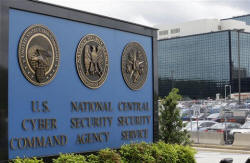 |
|

Is 41 pct the ceiling for NSA support?
[August 06, 2013]
CAIRO (AP)
--
|
For pollsters, the query actually is complex because the answer varies greatly depending on how they ask the question. In some cases, writing poll questions is pretty straightforward. Consider questions about how someone intends to vote. There's really only one way a person being asked whom they'd vote for could interpret the candidates' names and party affiliations, the office they're seeking and the date of the election. But when pollsters are dealing with a classified program run by an agency few people have heard of, decisions about what details to include in a question become much more meaningful. The Pew Research Center conducted an experiment to test the impact of question wording on public support for the surveillance programs. The center found that although no wording generated majority backing for government collection of U.S. communications records or content, people were more likely to say they favored the program if it was described as operating "with court approval" or as "part of anti-terrorism efforts." But whether the government reviewed Americans' phone calls or email made no difference in public support, and collection of metadata (described alternatively as "date, time and email addresses from nearly all email communications in the U.S." or "date, time and phone numbers from nearly all phone calls made in the U.S.") rather than content of communications made the public just a bit more supportive. The tested language did not mention the NSA or the Obama administration. All told, the poll found support ranged from a low of 16 percent (for a program collecting the content of U.S. communications without any mention of court approval or anti-terrorism efforts) to a high of 41 percent (if the government gathered metadata with court approval as part of anti-terrorism efforts). Those figures generally are lower than public support for the program in other national telephone polling on the topic, regardless of the wording. An AP review of those findings shows a range of support, from 37 percent telling Gallup's pollsters they approve of a government program to obtain "records from larger U.S. telephone and Internet companies in order to compile telephone call logs and Internet communications" as part of efforts to investigate terrorism, up to 75 percent approval for "federal government agencies collecting phone records of Americans that the government suspects of terrorist activity" in a June CBS News poll. A separate Pew Center study in July landed in between, with a divided public on "the government's collection of telephone and Internet data as part of anti-terrorism efforts" -- 50 percent approved, 44 percent disapproved. Note that this question did not specify that the communications were in the U.S. In truth, there isn't a good way to pin down perfect wording on a topic this complex, and it's clear pollsters are adapting their wording as they go. In the two months since Snowden revealed the programs, very few pollsters have repeated basic up-or-down wording exactly as it was the first time they asked it. Interested readers are left to choose their own polling adventure. ___ Online: Pew Research Center experiment: |



